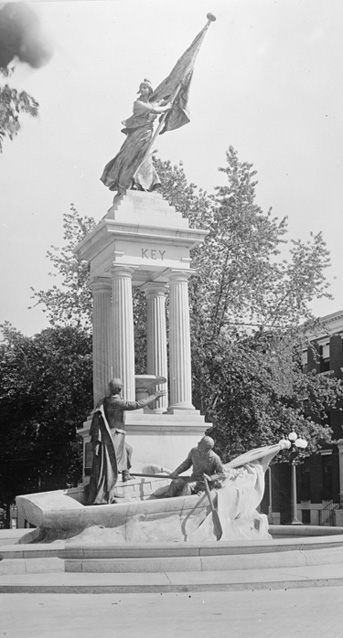As Francis Scott Key watched the British bombs and rockets’ exploding over Fort McHenry in the Baltimore harbour, his main concern was to see if the American flag still flew. When dawn arrived, he wrote lyrics that would capture a moment and unite a nation.
“While the bombardment continued, it was sufficient proof that the fort had not surrendered.” an American officer describing the bombardment of Fort McHenry

Library of Congress, Prints and Photographs Division
Almost every American is familiar with the lyrics and melody to the national anthem, a song that celebrates American courage and determination. Far fewer know the circumstances and events that gave rise to the lyrics, which commemorate not a glorious victory but the refusal of Americans to yield to a fierce bombardment.
From August 29 to September 2, 1814, a British naval squadron raided Alexandria, a prosperous Virginia port city on the Potomac. A few miles upriver, Washington was still in ruins after British armies set fire to the city.
As the British squadron withdrew from the Potomac on September 2, Francis Scott Key, a lawyer and militia volunteer, received an important assignment. The British had kidnapped Dr. William Beanes, a prominent physician. President Madison had authorized Key to pursue the squadron and negotiate the doctor’s release.
Key reached the fleet, but the British officers would not release any of the Americans until after their attack on Baltimore. Key remained as an unwilling guest while the British prepared a siege.
When the British fleet arrived in the bay at Baltimore, the three Americans watched as the ships began a long bombardment of Fort McHenry, the principal defense of the city’s harbor. One of the officers in the fort recalled that “15 to 1800 shells were thrown by the enemy” over 25 hours, mostly during the night.
According to his brother-in-law, Key “remained on deck during the night, watching every shell from the moment it was fired, until it fell, listening with breathless interest to hear if an explosion followed. While the bombardment continued, it was sufficient proof that the fort had not surrendered.”
When dawn finally broke, Key saw that the American flag still flew above the fort, and wrote some lyrics on the back of a letter. The British fleet withdrew and Key was left in Baltimore. He quickly printed handbills of his song, which he called “Defence of Fort M'Henry.”
Today, Key’s song is known as the “Star-Spangled Banner,” and became the national anthem of the United States of America in 1931. The song’s lyrics capture the resilience of the American soldiers who withstood the bombardment throughout the night. The bombs bursting in air and rockets’ red glare were not just descriptions; they became a national symbol of resistance. Although Washington was in ruins, Baltimore had proven that America was prepared to weather turbulent times.
Last updated: May 24, 2016
